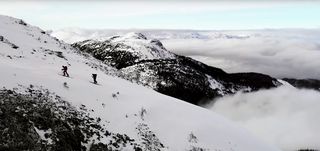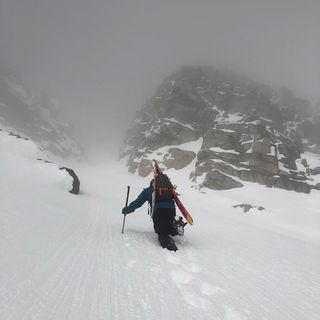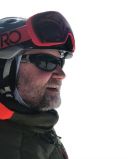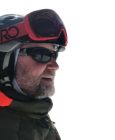Happiness
Ski-Mountaineering and Self-Knowledge
Can high-altitude exploits boost happiness?
Posted November 12, 2019
Based in Revelstoke, British Columbia, ski-mountaineer Greg Hill has completed many first descents but is best known for climbing and skiing 2 million vertical feet (609km/378 miles) in 2010. This feat required him to ascend (and then descend) 71 mountains in North and South America in one calendar year – and he did about half of them solo. The following year, Men’s Fitness magazine not surprisingly named Hill one of the ‘Top 25 Fittest Guys in the World’. He has summited and skied over 220 mountains all over the globe, including in Scandinavia, the Alps, Nepal, and Pakistan.

For Hill, the mountains represent a bottomless source of energy and happiness. When I spoke to him he pointed out a history of depression among the men in his family but said he has avoided that illness. ‘In my family, there are some “dark passengers” but I don’t feel I have that, and maybe it’s because I’ve spent so much time working on myself in the mountains. The mountains have given me time to work on getting rid of all the clutter that makes you focus on things that don’t matter. I believe being out there helps you figure out how to be happy.’
Studies are backing up Hill’s belief. In the form of participatory education programs, mountain-based adventure may boost well-being, mindfulness, and self-efficacy in youth—and relieve mental stress and time pressure.
Hill is the first North American to climb and ski Mont Blanc in a day (11 hours) and has pioneered many British Columbian traverses, including the Monashee Range (in southeastern British Columbia, stretching into Washington State) over a period of three weeks, at an incredible one-peak-per-day pace. In the midst of his sky-touching heroics, sustained by off-the-charts endurance, Hill is still able to make unexpected discoveries about himself.
'Eventually, you’re so tired that you don’t care if people like you, and you don’t care what you’re wearing...'
‘To know my limits is to know who I am,’ he said. ‘When I’m into a 20-hour day I can start to peel back my layers of worry: you peel back this layer and that layer and eventually, you’re so tired that you don’t care if people like you, and you don’t care what you’re wearing … The idea is to figure out how to peel all those layers back right to your core person and make sure he’s happy and centered. And then the layers can go back on and they won’t matter as much because the core is good.

‘A lot of our issues come from the clutter we’re taught to lay on, every day. And we have to just muddle our way through it. And that makes us unhappy because we haven’t got that inner core of happiness to help us deal with all the outer layers. If you take away someone’s phone and take them out to where nothing matters but where they are, and what’s happening around them, it simplifies everything. It gives people that time to just stop and think.’
Self-Reliance
I asked Hill how he manages risk when ski-mountaineering. ‘Often I’m out touring with people and I see that they aren’t observant of all the hazards around us. There’s always about 20 percent of my brain that’s focused on the hazards and evaluating them constantly.
And because I know that 20 percent is focusing on that, I can free up the other 80 percent to enjoy and to understand how lucky I am to be there.’ To illustrate how crucial it is to be always managing risk, Hill described ski-mountaineering a peak in Nepal with a less-than-cohesive group.

‘They were all about ego and conquering the peak and I was about working with the mountain. I was the only guy with a shovel and a beacon… but I learned something because I saw how important it is to have partners with the same risk tolerance and the same thought-patterns.
The confidence that comes with self-reliance is key: once you develop the skills and you know your team is strong, you can… almost do whatever you want. The rules of the mountains make a lot of sense to me. They’re natural, not man-made, concocted rules. And obviously I love to watch the sun glint off the snow or the wind blow through the trees – I don’t consider myself a spiritual person but mountains bring me peace and raw beauty. In my successes, my failures and all my challenges, I’ve developed inner confidence that eventually echoes into everything else I do. I want to try to teach that to my kids, give them that confidence.’


